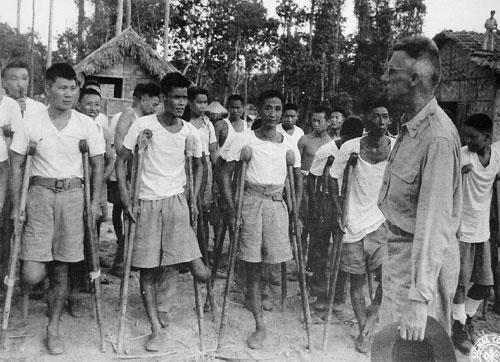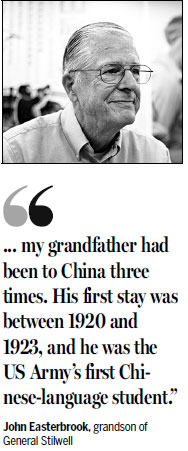The enigma that was 'Vinegar Joe'
By Zhao Xu (China Daily) Updated: 2015-02-27 07:34A long association with all things Chinese made Joseph Warren Stilwell the perfect candidate to oversee US operations against the Japanese in the China-Burma-India Theater during World War II. Although he's a controversial figure in his homeland, the late general is revered in the countries he helped to defend and liberate, as Zhao Xu reports.
|
General 'Vinegar Joe' Stilwell speaks with wounded Chinese veterans at a rehabilitation camp before their return to civilian life in July 1944. Provided to China Daily |
Editor's Note: This is the first in a series of special reports about the WorldWar II experiences of foreigners who either lived or served in China between 1937 and 1945.
He was a four-star general who shunned pomposity. An army commander who at times famously disagreed with his superiors and influential subordinates. A man at once criticized and revered.
Nearly 70 years after his death, General Joseph Warren Stilwell, commander of US Forces in the China-Burma-India Theater, or CBI, during World War II, remains an enigma.
Was he the acid-tongued "Vinegar Joe" of his detractors, or the easy-going, caring "Uncle Joe" who won the respect of his men and many others?
Whatever the truth, in China Stilwell remains a powerful symbol of US support for the country's wartime struggle against Japan.
"With General Stilwell, no one should draw easy conclusions," said his grandson, John Easterbrook, who visited Beijing in August to attend the opening of a photo exhibition called National Memories - China-US Collaboration during World War II.
"In a letter my father wrote, dated September 14, 1960, he cautioned the recipient to be careful with the diaries," he said, referring to a collection known as The Stilwell Diaries, held at the Hoover Institution Archives at Stanford University.
In 1944 and 1945, Ernest Easterbrook, Stilwell's son-in-law and the father of John, was on the general's CBI staff and handled his messages and special projects. The elder Easterbrook, who died in 1989, was struck by the sharp contrast between what he saw and heard about his commanding officer and what he later read in Stilwell's diaries.
"I know of incidents where General Stilwell had occasion to admonish someone for dereliction or indifference to duty. General Stilwell would speak in firm, concise terms but was most careful not to use abusive language," he later wrote in a letter. "At a later date, General Stilwell might refer to an occasion where he had 'really bawled out that so-and-so'."






